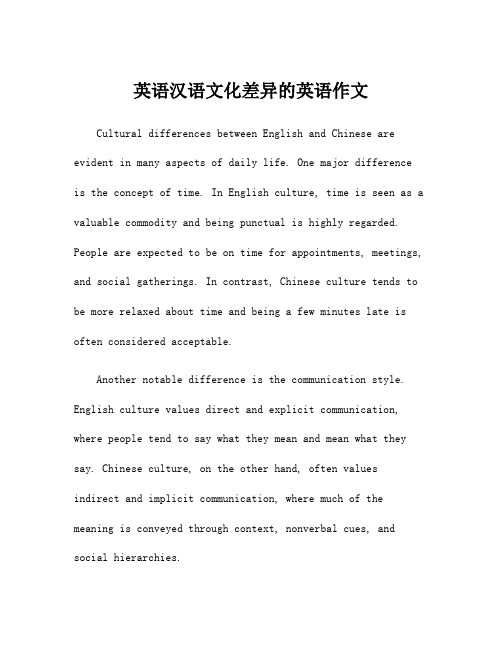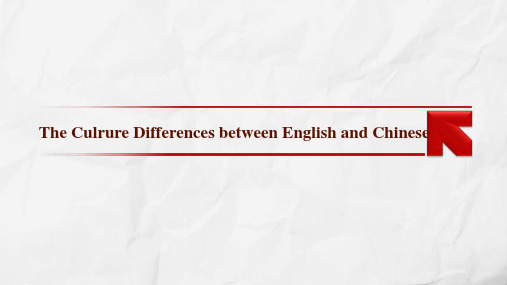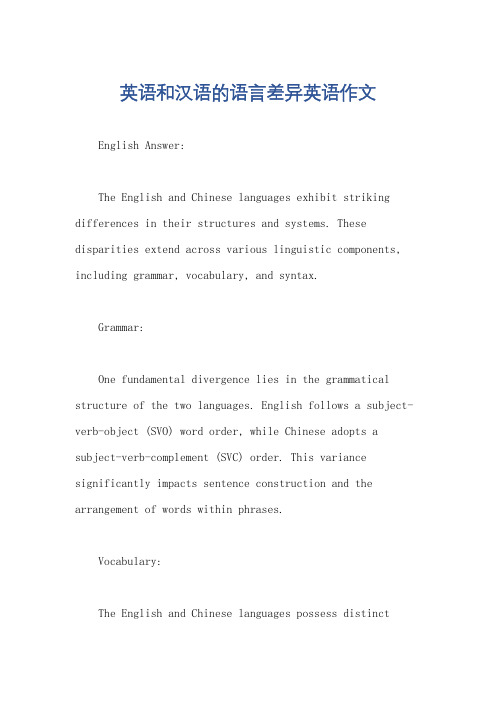differences between english and chinese idioms
请谈谈英语和汉语的差异英文作文

请谈谈英语和汉语的差异英文作文Differences between English and ChineseEnglish and Chinese are two of the most widely spoken languages in the world, with English being the most studied language globally and Chinese being the most spoken language in terms of native speakers. While both languages have their own unique characteristics, there are several key differences between English and Chinese that make them distinct from each other.One of the most obvious differences between English and Chinese is their writing systems. English uses the Latin alphabet, which consists of 26 letters, while Chinese uses characters, each representing a word or concept. Chinese characters are intricate and require memorization of thousands of characters, while English writing is based on phonetics, making it easier to learn and write.Another difference between English and Chinese is their grammar. English has a more complex grammar structure compared to Chinese, with rules for conjugations, tenses, and sentence structures. In contrast, Chinese grammar is relatively simple, with no verb conjugations or tenses. Instead, Chineseuses word order and particles to indicate the relationship between words in a sentence.Additionally, English and Chinese have different phonetic systems. English has a wide range of consonant and vowel sounds, while Chinese has a more limited range of sounds. Chinese is a tonal language, meaning that the tone in which a word is spoken can change its meaning. English does not have tones and relies on stress and intonation to convey meaning.Cultural differences also play a role in the differences between English and Chinese. English-speaking countries have a more individualistic culture, with an emphasis on independence and self-expression. Chinese culture, on the other hand, values collectivism and harmony, with an emphasis on social relationships and hierarchy.Despite these differences, English and Chinese also share many similarities. Both languages have rich histories and have borrowed words from other languages over time. They are also constantly evolving, with new words and phrases entering the lexicon as technology and culture change.In conclusion, English and Chinese are two distinct languages with their own unique characteristics. While they have differences in writing systems, grammar, phonetics, and culture,they also share similarities and have influenced each other over time. Learning both languages can open up new opportunities for communication and understanding between people from different backgrounds.。
英语汉语文化差异的英语作文

英语汉语文化差异的英语作文Cultural differences between English and Chinese are evident in many aspects of daily life. One major differenceis the concept of time. In English culture, time is seen as a valuable commodity and being punctual is highly regarded. People are expected to be on time for appointments, meetings, and social gatherings. In contrast, Chinese culture tends to be more relaxed about time and being a few minutes late is often considered acceptable.Another notable difference is the communication style. English culture values direct and explicit communication, where people tend to say what they mean and mean what they say. Chinese culture, on the other hand, often valuesindirect and implicit communication, where much of the meaning is conveyed through context, nonverbal cues, and social hierarchies.In terms of social interactions, English culture places high emphasis on individualism and personal space. People are encouraged to express their opinions, assert their individuality, and maintain a certain level of personal distance. In contrast, Chinese culture places more emphasis on collectivism and group harmony. People are more likely to consider the needs of the group over their individual desires and are comfortable with closer physical proximity.Another significant difference is the concept of face. In English culture, "saving face" is not as important as it isin Chinese culture. Chinese people are more concerned with maintaining their reputation and social standing, and are often willing to go to great lengths to avoid embarrassment or loss of face.In conclusion, the cultural differences between English and Chinese are diverse and complex, covering a wide range of aspects including time, communication style, socialinteractions, and the concept of face. Understanding and appreciating these differences are essential for effective communication and building positive relationships between the two cultures.。
differences between the two languages(完成)

Examples (2)
• 由于距离远,又缺乏交通工具,使农村 社会与外界隔绝,而这种隔绝,又由于 通讯工具不足而变得更加严重。 • Because there is a great distance and there are not enough transport facilities, the rural world is isolated. This isolation has become more serious because there are not enough information media.
– 北京我没到过。 – 他脸色不大好。 – 自行车骑走了。 我的法语看报很吃力。 这墙没法钉钉子。 家里的事不用你管。
Examples
– Do you see the glass as half full rather than half empty?
盛有半杯水的杯子,你是否只考虑它有水 的一半,而不管那没水的一半?
4.那个家伙老是滔滔不绝讲个不停。
• That fellow is very talkative.
Cultural Difference between English and Chinese
• Definition of culture
• • • • • • 文化背景上的不同 风俗上的不同 联想上的不同 制度、信仰和世界观不 同 社交礼节 翻译方法
• 卡莱尔大街往西伸展,越过一座黑色大桥,爬下 山岗又爬上去,经过许多小铺和肉市,又经过一 些平房,然后突然朝着大片绿色草地中止了。 • 此句属于主谓结构,句中只有一个谓语动词 “runs‖,但通过七个不同的介词,把六个名词串 起来使句子扩展开来。
– 汉语句子中,动词占优势 • 汉语动词没有什么动态变化,使用方便,且重 于动态描写,所以汉语动词用得多,汉语在表 达一些较复杂的思想时进往往借助动词,按时 间顺序,逻辑顺序,逐步交代,层层辅开,给 人以舒缓明快的感觉。句子结构像一根竹子一 样,一节一节地接下去。有人把汉语句子描写 成为有如海上万顷波涛,前后起伏,层层推进,请 看《红楼梦》中的一段: • 晴雯先接出来,笑道:“好啊,叫我研了墨, 早起高兴,只写了三个字,扔下笔就走了,哄 我等了这一天,快来给我写完了这些墨才算 呢!”
The Culrure Differences between English and Chinese英文和中文的区别

Greeting and parting
Greeting is an important part in daily life. When people meet friends or acquaintances, they often greet each other. The purpose of greeting is to establish or keep the social contact. But because of the cultural differences between Chinese and English, the manner of greeting and parting are different, it often causes misunderstanding. In China, people greet their friends might say:"Where are you going to do?" or "Have you eaten yet?" while American usually say "Hi" or "Hello" instead. If an English speaker does not understand this difference, he will sure misunderstand his chinese friend who really wants to know where he goes or invite him to eat something. As a foreigner ,he maybe treats them as a real question.
英语和汉语的语言差异英语作文

英语和汉语的语言差异英语作文English Answer:The English and Chinese languages exhibit striking differences in their structures and systems. These disparities extend across various linguistic components, including grammar, vocabulary, and syntax.Grammar:One fundamental divergence lies in the grammatical structure of the two languages. English follows a subject-verb-object (SVO) word order, while Chinese adopts a subject-verb-complement (SVC) order. This variance significantly impacts sentence construction and the arrangement of words within phrases.Vocabulary:The English and Chinese languages possess distinctvocabularies, with many words having different meanings and nuances. Additionally, the use of homonyms (words with the same spelling but different meanings) is prevalent in English, while Chinese primarily employs homophones (words with the same pronunciation but different characters).Syntax:Syntax refers to the rules governing the arrangementand combination of words within sentences. Englishsentences typically follow a linear structure, withmodifiers placed before the head noun. Chinese syntax, however, allows for greater flexibility, enabling the placement of modifiers either before or after the head noun.Comparative Constructions:Comparative constructions, used for comparing two or more entities, exhibit notable differences between English and Chinese. In English, "more" and "less" are employed to indicate degrees of comparison, while Chinese utilizes "比" (bǐ) and "比不上" (bǐ bù shàng) for the same purpose.Measure Words:Measure words are a unique feature of the Chinese language that do not have a direct equivalent in English. They function as quantifiers, specifying the units of measurement for nouns. For example, "个" (gè) is used for counting individual objects, while "辆" (liàng) is usedfor vehicles.Tones:Chinese is a tonal language, meaning that the pitch or intonation of a syllable can alter its meaning. English, on the other hand, is a non-tonal language, with meaning conveyed primarily through the combination of words and their grammatical context.Culture and Context:Beyond linguistic differences, the English and Chinese languages reflect the distinct cultures and societal normsof their respective speakers. Certain words and phrases may have culturally specific meanings or associations that are not readily translatable into the other language.中文回答:英语和汉语在语言结构和体系上表现出显著差异。
谈谈英语和汉语的区别作文900

谈谈英语和汉语的区别作文900English and Chinese are two of the most widely spoken languages in the world, each with its own unique characteristics and complexities. As a native English speaker who has studied and become proficient in Mandarin, I have had the opportunity to observe and appreciate the differences between these two languages. In this essay, I will discuss some of the key differences between English and Chinese.One of the most noticeable differences between English and Chinese is the writing system. English uses the Roman alphabet, which consists of 26 letters that can be combined to form words. Chinese characters, on the other hand, are logograms that represent words or ideas. There are thousands of Chinese characters, each with its own unique meaning and pronunciation. Learning how to read and write Chinese characters can be a daunting task for non-native speakers, as it requires memorization and practice.Another key difference between English and Chinese is the grammar structure. English follows a subject-verb-object (SVO) word order, while Chinese follows a subject-object-verb (SOV) word order. This can lead to confusion for English speakers learning Chinese, as sentences are structured differently.Additionally, Chinese does not have verb conjugation or tense markers like English does. Instead, tense and aspect are indicated through context and additional words.Pronunciation is another area where English and Chinese differ. English has a complex system of vowels and consonants, with many different sounds and phonetic rules. Chinese, on the other hand, has a relatively simple phonetic system with fewer sounds and tones. The tones in Chinese can be challenging for English speakers to master, as they can completely change the meaning of a word.Cultural differences also play a role in the distinctions between English and Chinese. Chinese is a tonal language, meaning that the tone in which a word is pronounced can change its meaning. This aspect of the language reflects the importance of proper pronunciation and tone in Chinese culture. In contrast, English places more emphasis on intonation and stress patterns to convey meaning.In conclusion, English and Chinese are two vastly different languages with their own unique characteristics and complexities. From the writing system to grammar structure to pronunciation, there are many differences that make learning each language a challenge. By understanding and appreciating these differences,language learners can gain a deeper understanding of the rich linguistic and cultural heritage of both English and Chinese.Overall, the study of English and Chinese offers a valuable opportunity to explore the diversity of human language and communication. As the world becomes more interconnected, proficiency in multiple languages will become increasingly important. By studying and comparing languages like English and Chinese, we can enrich our understanding of the world and bridge cultural divides.。
The Culrure Differences between English and Chinese英文和中文的区别(课堂PPT)
2020/8/4
5
If an English-speaking hostess is complemented for her cooking skill, she likely to say: "I' m so glad that you liked it. " But to a Chinese hostess, she likely to say: " oh, no! Where, where... I just made some dishes casually and they are not very tasty. " Which made his foreign friend embarrassed. Appropriate compliments can serve as effective supplementary means in inter-personal communication. So when we meet our friends, we'd better accept their compliments directly.
2020/8/4
3
Address
Both English and Chinese people have two kinds of personal names---a family name and a given name. But the order and the use of these names in the two languages are somewhat different. So for the beginner of English, English address is not so easy to learn. Because of the culture differences, Chinese often put the family name in the first place; while American is used to put it at the end.
basic differences between English and Chinses 3
Spring has so much more than speech in its unfolding flowers and leaves, and the coursing of its streams, and in its restless seeking.这是一个秋天的下午.细雨淅沥,秋风瑟瑟.他们撑着雨伞,攀沿一条弯弯曲曲的山间小道去拜望一位隐居在深山的朋友.We had plenty of company in the way of wagonloads and mule-loads of tourists----and dust.We had some good laugh on the way.She gave us a big smile and a friendly wave.That bee gave me a nasty sting.He took a deep breath and dived into the water.Under the guidance of the new teacher, Tom is making amazing progress.He used to be a politician. But now he becomes a businessman.妻子的出走使他很伤心。
他讲的话使在场的人很感动。
她的回答没有使任何人感到意外。
这一技术使产量大大提高。
这个消息是我吃不下饭,睡不着觉。
这项新政策旨在使人民得到更多实惠。
This is a good piece of work.What can easily be seen in his poems are his imagery, orginality and power.他表示愿意帮助我,我拒绝了。
我对他越来越敬佩。
他因受贿而被捕。
警察及时赶到,制止了骚乱。
他们未能达成协议,他感到遗憾。
英汉两种语言和文化的差异英语作文
英汉两种语言和文化的差异英语作文Differences between English and Chinese language and cultureLanguage is a fundamental aspect of a culture, and it plays a critical role in shaping the way people think and communicate. English and Chinese are two of the most widely spoken languages in the world, and they come from vastly different linguistic and cultural backgrounds. In this essay, we will explore the differences between English and Chinese language and culture.One of the most significant differences between English and Chinese is the writing system. English uses the Latin alphabet, which consists of 26 letters, while Chinese uses characters that represent words or concepts. Chinese characters are visually complex and require a great deal of memorization to learn. In contrast, the Latin alphabet is relatively simple and easy to learn.Another key difference between English and Chinese is the sentence structure. English follows a subject-verb-object order, while Chinese follows a subject-verb-object order. This difference in sentence structure can lead to misunderstandings between speakers of the two languages. For example, a Chinesespeaker may have trouble understanding a sentence in English because of the different word order.In addition to the differences in writing system and sentence structure, English and Chinese also have differences in pronunciation and phonetics. English has a relatively small number of distinct sounds, while Chinese has a larger number of tones and phonemes. This means that Chinese speakers may have difficulty pronouncing certain English sounds, and vice versa.Cultural differences also play a role in shaping the languages of English and Chinese. For example, Chinese culture places a high value on politeness and formality, which is reflected in the language. Chinese speakers often use honorifics and formal language when speaking to elders or authority figures. In contrast, English speakers are more likely to use informal language and may not place as much importance on politeness.Another cultural difference between English and Chinese is the concept of individualism versus collectivism.English-speaking cultures tend to emphasize individual freedom and autonomy, while Chinese-speaking cultures place a greater emphasis on harmony and group cohesion. This difference in cultural values is reflected in the languages themselves. Forexample, English has a greater variety of pronouns to indicate individual identity, while Chinese has fewer pronouns that emphasize group identity.In conclusion, English and Chinese are two vastly different languages with distinct linguistic and cultural characteristics. Understanding these differences is essential for effective communication and can help bridge the gap between speakers of the two languages. By recognizing and appreciating the unique qualities of each language, we can learn to communicate more effectively and appreciate the richness of both English and Chinese culture.。
关于中文和英文差异的英语作文
关于中文和英文差异的英语作文The differences between Chinese and English are vast, spanning from language structure to cultural implications. When you learn Chinese, you'll notice it's a character-based language, with thousands of unique symbols representing words or ideas. That's quite different from English, which relies on an alphabet of 26 letters to form words.In Chinese, sentences often lack subjects, yet the meaning remains clear through context. You'll also find verbs don't change form for tense or plurality, which can be confusing for English speakers. But that's just the tip of the iceberg. Chinese uses tones to distinguish words, adding another layer of complexity.Cultural nuances also play a role. Chinese greetings are often more formal and respectful, reflecting a collectivist culture that values harmony and deference to elders. In contrast, English greetings tend to be morecasual, reflecting a more individualistic society. Humor and sarcasm are also interpreted differently in the two languages, so what's funny in one might be confusing or even offensive in the other.Another interesting difference is in writing styles. Chinese writing often favors conciseness and ambiguity, allowing readers to fill in the gaps with their own imagination. English, on the other hand, tends to be more explicit and direct, leaving less room for interpretation. This reflects the different values and communication styles of the two cultures.Overall, learning to appreciate the differences between Chinese and English is not just about language mastery but also about cultural understanding. Each language opens.。
- 1、下载文档前请自行甄别文档内容的完整性,平台不提供额外的编辑、内容补充、找答案等附加服务。
- 2、"仅部分预览"的文档,不可在线预览部分如存在完整性等问题,可反馈申请退款(可完整预览的文档不适用该条件!)。
- 3、如文档侵犯您的权益,请联系客服反馈,我们会尽快为您处理(人工客服工作时间:9:00-18:30)。
The Similarity and Discrepancy between
English Idioms and Chinese Idioms
Idiom is a brief, vivid, popular and easy to understand form of language expression created by people during the daily practice. Idiom is a special form of culture. As we know, the culture is interlinked, so there are many similarities between English idioms and Chinese idioms. But every different kind of culture has its own characteristics, so there also some discrepancies between English idioms and Chinese idioms. And I will put forward some examples to represent the similarity and discrepancy between these two kinds of idioms.
First of all, I want to analyze the similarity. In some idioms, we can find that not only the meaning is alike, but the expression form is also similar between English idioms and Chinese idioms. There are some examples:
浑水摸鱼fish in troubled water
晴天霹雳 a bolt from the blue
一石二鸟kill two birds with one stone
同舟共济in the same boat etc.
From these idioms, we can easily find that the expressions between English idioms and Chinese idioms have the similar meaning and expression form. Though England and China are far from each other, and the cultures of these two countries are different, the thoughts of them are similar; I think it is very amazing.
Now, I want to say something about the discrepancy between English idioms and Chinese idioms. We can divide the discrepancy into two situations: one is that the expression form is different but the meaning is similar and vivid, another is that the expression form and meaning are both different and the meaning is not very good. These examples below can indicate my statement:
1. The expression form is different but the meaning is similar and vivid:
大智若愚still water runs deep
昙花一现 a flash in the pan
九牛一毛 a drop in the ocean
In the three examples, we can see that though the expression forms are different between English idioms and Chinese idioms, the meanings of English idioms are still perfect and vivid, not worse than Chinese idioms. And we also can learn much from the good expression form of English idioms.
2. The expression form and meaning are both different and the meaning is not presented well:
聚精会神to be all eyes and ears
孤注一掷put all one’s eggs in one basket
小题大做 a storm in a tea cup
格格不入 a square peg in a round hole
From these examples above, we can see that though the English idioms are related to the Chinese idioms, they have the different expression forms, and the meanings of English idioms are not vivid and not well expressed. As the idiom “to be all eyes and ears”, though it has the meaning of paying attention to something or doing something, it lacks the meaning of put one’s heart in doing something. While from the Chinese idiom “聚精会神”, we can feel the heart. I think that is the marrow of Chinese idioms and the shortcoming of English idioms as well.
There many similarities and discrepancies between English idioms and Chinese idioms, but I think both of them have their own characteristics, advantages and even shortcomings. As for us, we should keep the balance of them, and learn to take the essence and discard the dregs. If we all can do these well, our culture will develop very fast and our world will be harmonious.。
